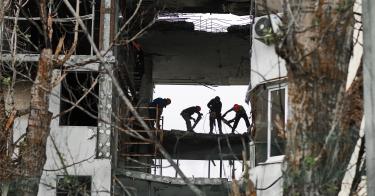Abstract. The cost of rebuilding Ukraine could tally as high as $1 trillion and take decades to complete. Western taxpayers have generously given tens of billions of dollars to support Kyiv against Moscow’s aggression, but Russia must finance the costs of what it has destroyed. Reconstruction offers Ukraine a historic moment to decouple itself from Russia and deepen its integration with its Central and Eastern European neighbors. The prospect of a more populous, economically vibrant, and security minded Eastern Europe will best ensure long term regional prosperity and geo-political peace with Russia.
Russia’s brutal military assault on Ukraine has destroyed large swathes of the country and dispersed millions of its people. Estimates to rebuild damaged infra-structure, industry, government, residential and commercial buildings could eventually reach $1 trillion and take decades to complete.
The West is providing Ukraine tens of billions of dollars in military, humanitarian, and economic assistance. In May, the U.S. Government approved a $40 billion aid package and the Biden Administration is expected to ask Congress for billions more this summer. Even as war continues, preparations are underway to create global mechanisms to finance Ukraine’s reconstruction. President Volodymyr Zelenskyy has set up committees to assess war damage and draft plans to rebuild. Europe is setting up a Solidarity Trust Fund to provide humanitarian, short-term liquidity, and reconstruction relief. The International Monetary Fund has established a Multi-Donor Administered Account for Ukraine with similar arrangements underway at the World Bank and European Bank for Reconstruction and Development.
But taxpayers, especially in the United States, are already bristling at having to borrow billions of dollars more to finance Ukrainian government salaries, pensions, and social services as they face increasing economic hardship at home stemming from high inflation, increasing interest rates, stagnant wages, and shrinking retirement accounts. Failed reconstruction efforts in Iraq and Afghanistan have soured American support for another large-scale aid adventure.
As debate over who will pay for Ukraine’s reconstruction continues, the West has a historic opportunity to sever Russia’s geo-economic stranglehold over Ukraine. Now is the time for Ukraine to strategically plan out its economic future in ways that will promote its unalterable integration into the West and economically decouple it from Russia.
RUSSIA MUST PAY
President Zelenskyy is adamant that Russia “will reimburse us for everything you did against our state, against every Ukrainian, in full.” The West should refrain from its reflexive habit of responding to every global crisis by throwing lots of money at it and, instead, commit itself to fulfilling Zelenskyy’s fair demand. Vladimir Putin will refuse yet there are international mechanisms available to make Russia pay irrespective of what he wishes. Making Russia pay for Ukraine’s reconstruction would unburden Western taxpayers from an exorbitant price tag and, in turn, help sustain continued military support to Ukraine.
First, the European Commission has seized over $30 billion in assets belonging to Russian oligarchs it has individually sanctioned for nefarious ties to Putin (the U.S. Treasury Department has seized an additional $1 billion in private Russian assets). Yachts, real estate, artwork, bank accounts, and other objects of value should be sold and sales proceeds directed to fund Ukraine’s government budget requirements. These funds can jumpstart the rebuilding of schools and hospitals and restore basic services in areas Ukrainian forces liberated from Russian occupation, especially around Kyiv, and signal to Ukrainian refugees they can return home.
Second, there is over $600 billion in Russia’s overseas foreign reserves, half of it frozen by G7 central bankers. These reserves represent a substantial source of potential financing for Ukraine’s current financial and future reconstruction needs. Germany’s Finance Minister declared he was “politically open to the idea of seizing foreign assets of the Russian Central Bank.” Last month, Estonia, Latvia, Lithuania, and Slovakia called on Brussels “to enforce an international war-compensation mechanism, by using Russian assets to finance reconstruction of Ukraine.” Support is gaining traction among other G7 finance ministers. The Biden Administration however stands in the way fearing such a move violates international law. This White House would prefer that U.S. taxpayers foot Putin’s bill. The U.S. Congress must demand it and make whatever legislative fixes to deny the Administration further excuses to drag its feet.
Third, Russian energy exports can be taxed to fund war reparations to Ukraine and must be part of any negotiated settlement. The Brussels-based Wilfred Martens Centre for European Studies argues for a “Solidarity with Ukraine” levy on European energy imports from Russia that could be passed on to Russia based on the current 35% discount it currently offers jittery energy buyers. Russia can afford to finance Ukraine’s reconstruction. With energy prices soaring over the past year, Russian oil revenues are one-third higher now compared to last year standing at $20 billion per month. Though Europe is ending its oil purchases it will continue to import large volumes of Siberian natural gas upon which it can impose a reconstruction levy by leveraging its near gas monopsony with Russia. Energy dependency works both ways.
AID MUST REORIENT UKRAINE’S ECONOMIC INTEGRATION WESTWARD
Irrespective of political decisions about who pays for Ukraine’s reconstruction, Russia’s brutal invasion has hastened Kyiv’s political orientation westward. Putin’s naval blockade of Ukraine’s grains exports through the Black Sea and occupation of southern Ukraine has had the salutary effect of increasing regional economic cooperation from Poland southward to Romania which is providing Kyiv alternative routes to reach global markets. Reconstruction plans should prioritize building upon these emerging regional economic ties and shore up the road, rail, energy, industry, telecom, and port infrastructure facilities needed to establish stronger and more permanent trade and investment links between Ukraine and the rest of Europe. This trend will deny Moscow future opportunities for economic blackmail.
Tying its economic future to Eastern Europe brings Ukraine other benefits. Kyiv has struggled with overcoming its Soviet legacy of endemic corruption, loss-making state-owned enterprises, a weak judiciary, and lax property laws—the exact opposite of what Ukraine needs if it is to stabilize politically and economically decouple from Russia. Warsaw, Tallinn, Prague, Bucharest capitals are far better options than Brussels or Washington, D.C. to advise Ukraine on executing free market reforms that will unleash cross-border private sector energies and capital that must be at the center of Kyiv’s post-war strategy. War has forged a strong common purpose within Ukraine and solidarity from its neighbors that can be parlayed into accelerated regional integration. Trade and private investment—not aid—creates wealth. Last year Poland attracted $4 billion in greenfield foreign direct investment alone, fifth best worldwide, offering Ukraine a replicable playbook. Paradoxically, the more free money Western donors offer Ukraine the more likely it will remain poor, unbuilt, and vulnerable to further Russian sabotage.
For the United States, the prospect of a more populous, economically vibrant, and security-minded Eastern Europe to offset the Western European, especially German, penchant to ignore Russian misbehavior in exchange for cheap energy should be welcome news. Westward regional integration will ease the current global food crises. Washington, D.C. could then fully face its principal geostrategic threat, Communist China. Whatever reconstruction aid the U.S. Government provides should be narrowly focused on promoting Ukraine’s integration with Eastern Europe.
This piece originally appeared in Geopolitic.ro




